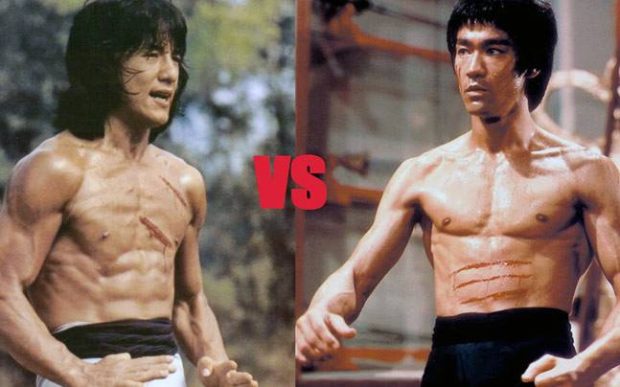
Bruce Lee, Jackie Chan cast as contrasting figures in dramatic events unfolding in Hong Kong

By Ivan Lim
Former AJA President
Singapore: Two iconic Hongkong martial artistes, the late Bruce Lee and Jackie Chan have been cast as contrasting faces of the civil disobedience movement that is roiling Hong Kong in the past four months.
Organisers of the anti-government movement have attributed their flash-mob street demonstrations, that quite often caught police off-guard, to Bruce Lee’s “go-with-the- flow” Kung Fu principle. Be soft and yielding, is the way to overcome the strong and mighty.
“…Now if you put water into a cup, it becomes the cup. Put it into a teapot, it becomes the teapot. Now water can flow, or creep or drip or crash. Be water, my friend,” he said, illustrating his Wing Chun Kung Fu master Yip Mun’s key teaching of being detached, formless and shapeless like water.
While drawing inspiration from the “Enter the Dragon” hero who died at 33 in 1973, they have derided Jackie Chan, 65, “as an actor who has lost his own soul”. This, after the star of The Legend of Drunken Master commented on the protest’s disruptions and violence. “Safety, stability and peace like air, when you lost them, you will realise how precious they are.”
Jackie also posed the sensitive question of patriotism.
At the height of the escalating civil unrest, the actor-director of comedic Kung Fu films had signed up to the China TV hashtag # the five-starred red flag has 1.4 billion flag guards after protesters threw the Chinese national flag into the sea on August 3.
“As a Hongkong citizen and as a Chinese, I am a national flag guard,” he added.
Bruce Lee’s mantra “Be Water, my friend” is rooted in his philosophical study of Lao-tzu the 6oo BC. Chinese sage, a master of the theory of opposites for resolving conflicts, who popularised the concept of Wu Wei or non-action: “Nothing in the world is softer and weaker than water, but in attacking the hard and strong there is nothing which outdoes it. It is easy for it because of its non-being.
In Jackie Chan’s book, law and order are paramount. His parents were refugees who escaped to Hong Kong from the civil war in China.
A Hong Kong delegate of the Chinese People’s Political Consultative Conference, an advisory body dedicated to a peaceful and united motherland, he has probably a keen sense of chaos in society.
History has shown that throughout the centuries China had been plagued by peasant uprisings, ethnic. unrest and ideological conflicts that wrought. havoc and discord, the “ancient twin evils of internal disorder and external aggression”.
The outcome had been either overthrow of the rulers or the crushing defeat of rebels, but certainly the suffering of the common populace.
Images of Hong Kong pro-democracy protesters waving the Union Jack as well as the Stars and Stripes and singing the American national anthem while calling on President Donald Trump to ‘liberate” the territory, have trained the spotlight on patriotism.
On screen, Bruce Lee, like Jackie Chan, has his patriotic side too, often taking up cudgels on behalf of his fellow countrymen.


